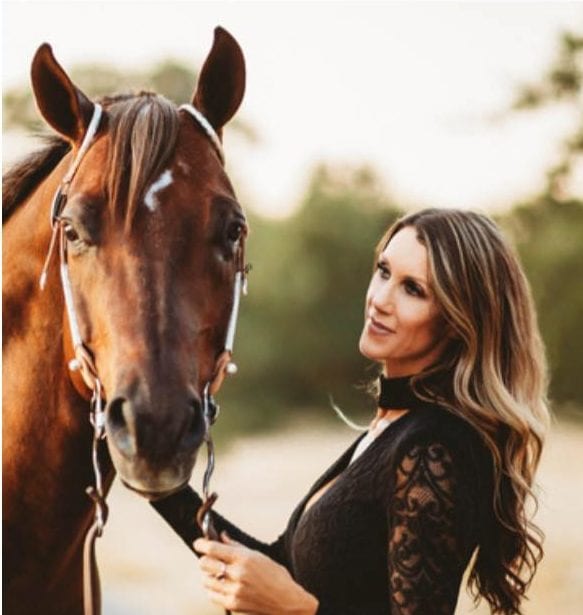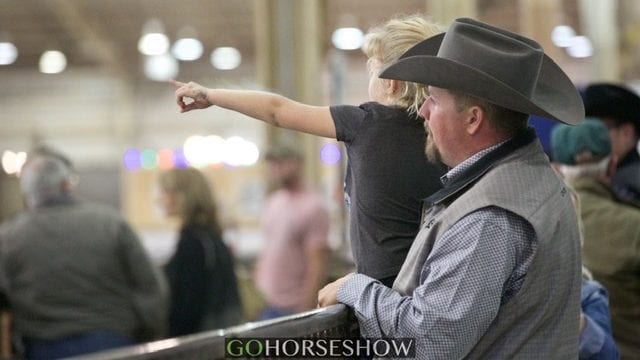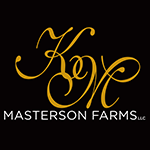Horses teach their riders skills that reach far beyond the show pen. Individuals learn the importance of work ethic, sportsmanship, gratitude…the list is infinite. These skills can translate into other environments as well, such as school and work.
Developing fundamental qualities such as work ethic and determination, allow for an equestrian to strive for their goals. This could be a goal in the show pen, like winning a particular class, or this could be a goal for everyday life, such as getting an A on an exam or going for a job promotion.
We talked to amateur and amateur select exhibitors who are successful, both in and out of the show pen. They share their insight as to the values learned from horse showing. Whether you win or lose, an exhibitor who appreciates their life lessons learned from horse showing will gain something far more valuable than any trophy.
Work Ethic
 The value of a robust and unwavering work ethic is priceless. Riding horses teaches exhibitors that they need to work hard for every stride. This sport is unique because it requires not only taking care of oneself as an athlete, but also caring for their equine teammate.
The value of a robust and unwavering work ethic is priceless. Riding horses teaches exhibitors that they need to work hard for every stride. This sport is unique because it requires not only taking care of oneself as an athlete, but also caring for their equine teammate.
Amateur competitor and veterinary school student, Meghan Murphy Sabbagh comments, “Talent only gets you so far, you have to want to put the time in to succeed. Growing up, I spent countless hours practicing with my horses every day. The work ethic I developed has transferred into my everyday life and career.”
Possibly more important than talent, it is the hard work and determination that sets apart the “good” from the “great.” This ideology also applies to work and school environments. If someone wants a specific job position or promotion, they must have an undeniable work ethic.
Adaptability also parallels a strong work ethic. Exhibitors learn the importance of adapting to any situation at hand.
 Sarah Lebsock, an amateur competitor who recently finished completing her Masters of Health Administration at the University of Cincinnati, reflects on how this helped her in college and her career.
Sarah Lebsock, an amateur competitor who recently finished completing her Masters of Health Administration at the University of Cincinnati, reflects on how this helped her in college and her career.
“Adaptability in college, and now in my career, is what allows me to focus on what I can do right now to get a positive result. I never get stuck on things not going according to plan.”
Responsibility
Learning the importance of responsibility often comes at a much younger age for equestrians. When showing and riding horses, the second half of the team is a 1,200+ pound animal who needs to be cared for. They need their stalls mucked, hair brushed, vet appointments schedule…the list is quite long.
Equestrians also learn that they are responsible for their own actions. In the show pen, if a mistake is made due to rider error, that blame should not be placed on anyone else but the rider.
Meghan comments, “Responsibility is probably one of the biggest traits we learn when showing and caring for horses, and it is a trait that carries over to every aspect of our lives. Your horse is a living animal that depends on you, just like people such as our coworkers, patients/clients, etc. depend on us in the workplace.”
Whether clients at a job, group mates on a team project, or a horse and rider, there is always someone who must hold the responsibility. Horse showing teaches that key trait which can guide an individual on the path to success.
Gratitude
 Horse showing teaches exhibitors to be grateful for even the smallest things in life. It is a privilege to ride horses, let alone travel to shows and compete. Equestrians learn to appreciate the ups and downs of each journey. This skill translates into more gratitude outside of the show pen as well.
Horse showing teaches exhibitors to be grateful for even the smallest things in life. It is a privilege to ride horses, let alone travel to shows and compete. Equestrians learn to appreciate the ups and downs of each journey. This skill translates into more gratitude outside of the show pen as well.
Amateur exhibitor and business owner, Amy Groefsema states, “I admire and am amazed at the many careers that my competitors have, and the fact that we all manage to balance careers, family, and success in the show pen. I believe we are all grateful for the ability to do what we love to do.”
Juggling horse showing, work, and family is a balancing act. This balance leads to the everlasting gratitude of equestrians.
Communication
Communication is a crucial aspect of any work, school, or horse show environment. This is the basis for everything to “flow” efficiently. In the show pen, a rider must communicate with the horse through their riding.
Outside of the arena, the rider must be able to respectfully and effectively strategize with their coach. The show office staff must be able to communicate with one another, and so on. Select Amateur Leena Volmer says, “Not only do horse show exhibitors have to learn how to work as a team with their horses, but they also learn how to develop positive bonds and communication with others – their trainers, their barn mates, fellow competitors, horse show staff, etc. Learning how to develop and maintain positive relationships is a value which can play an imperative role in achieving success in other aspects of life.”
Select Amateur Leena Volmer says, “Not only do horse show exhibitors have to learn how to work as a team with their horses, but they also learn how to develop positive bonds and communication with others – their trainers, their barn mates, fellow competitors, horse show staff, etc. Learning how to develop and maintain positive relationships is a value which can play an imperative role in achieving success in other aspects of life.”
Positive relationships with others are forged through communication. It is an essential life skill that leads to success in every facet of life.
Sarah adds, “For a young exhibitor, the interactions with such a variety of people and ages of people make moving into the professional world so much easier. We can talk to anyone, any age, any status, and feel comfortable. There’s a value of professionalism we learned at a very young age that allows us to be successful from the very beginning of our careers.”
Defeat
Learning how to accept defeat and “rise from the ashes” is an invaluable skill. Motivational speaker Zig Ziglar once said, “If you learn from defeat, you haven’t lost.” Horse showing is challenging, comparable to a rollercoaster full of twists and turns.
Leena states, “Our ability to learn how to accept defeat at a horse show in a positive manner most certainly transfers over into learning how to do so in everyday life. Sometimes we don’t get the job promotion we wanted and worked hard for, or maybe we didn’t score as high on a test that we needed to.”
Whether you lost out on a job promotion, failed a test, or did poorly in the show pen, defeat is possible in every aspect of life. Learning how to turn that defeat into a comeback is what allows individuals to lead a successful life, both in and out of the show pen.
Volmer concludes, “Our passion for showing horses helps us to come to terms with defeat and gives us the inner tools and motivation to keep working even harder and never to give up!”









